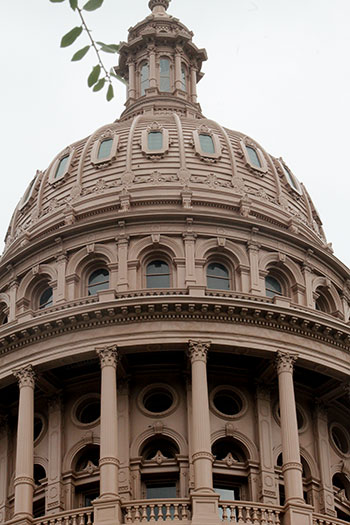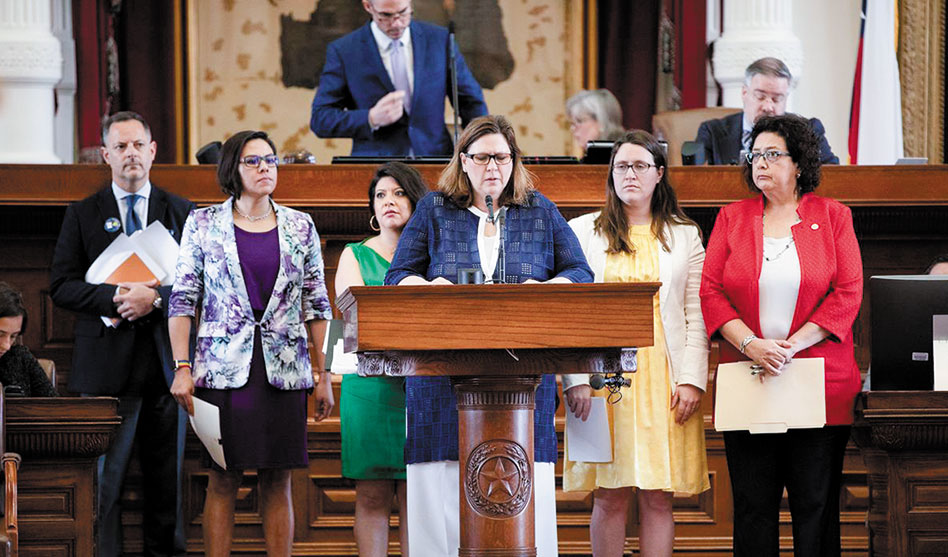Members of the Texas House’s LGBTQ Cauccus
The 88th session of the Texas Legislature started out looking promising for the LGBTQ community, with a record eight LGBTQ members sworn into office. Some of those eight were even assigned positions as vice chairs of committees.
But things turned ugly quickly, as a record number of anti-LGBTQ bills were filed by lawmakers, many of them targeting transgender youth and the drag community.
Hostility toward the LGBTQ community took an ugly turn on Feb. 15 when two resolutions — one in the House and one in the Senate — welcoming visiting members of the state’s four LGBTQ Chambers of Commerce to the Capitol were voted down. Welcoming resolutions are routinely passed by lawmakers; in fact, LGBTQ representatives couldn’t remember another such resolution having failed.
About a month later, 1,800 transgender Texans and their allies gathered at the Capitol to testify against a ban on trans college student athletes. Because hearing rooms seat only about 100 people, others visiting the Legislature fanned out across the building, sightseeing in the landmark many had never visited before.
The crowds that day were large but well behaved. Still, one Republican House member described the scene as “worse than Jan. 6,” referring to the insurrection and damage done to the U.S. Capitol two years earlier, even though none of the visitors broke windows, smeared feces on the wall or threatened to kill any lawmakers or other state officials.

The Texas Capitol
During the regular session, more than 140 anti-LGBTQ bills were filed for consideration by the House and Senate, a record number of homophobic pieces of legislation to be considered in one session in any session of any legislature in the U.S. And while the trans community was the target of most of the legislation, legislators also took aim at drag queens.
One of the worst bills, introduced by Rep. Steve Toth, would have allowed anybody who saw a drag show when they were under 18 to file a lawsuit against anyone who hosted or performed in the show. That reckless bill got nowhere.
But another bill advanced. SB 12, a ban on drag performances, was reworded several times, and the final version removed the word drag. But the bill was so broadly written that, if upheld after passage, a number of Broadway musicals would be prevented from coming to Texas.
Sen. Royce West, who has always been an LGBTQ ally, voted for the final version of the anti-drag bill. But after hearing criticism for his vote, West admitted he had never been to a drag show then met with LGBTQ activists and put out an announcement that he regretted his vote.
Because of the anti-LGBTQ atmosphere in the Legislature, a new Houston lesbian bar reported it was denied insurance because of drag shows.
While Republicans were busy accusing drag performers and transgender people of being dangerous sexual predators and “groomers,” one of their own was actually preying on a young female intern. In May, House members voted to expel Rep. Bryan Slaton for drinking with and having sex with a 20-year-old woman. The “family values” Republican had previously filed a bill that would make homestead exemptions available only to heterosexual couples and another that would make performing in drag a felony.
Freshman Rep. Venton Jones, who is HIV-positive, made HIV awareness his cause, and several of his bills got hearings. In his first term in office, he passed legislation, something that rarely happens, and he was named Freshman of the Year by his colleagues.
Bathroom bills, pre-emption of local non-discrimination ordinances, religious refusal laws, denying corrected identity documents and more were proposed and killed by members of the LGBTQ Caucus who worked overtime to protect the right of the community. But seven anti-LGBTQ bills passed and were eventually signed into law by Gov. Greg Abbott.
Here is a list of the seven with a brief summary of the damage they cause:
SB 14 prohibits physicians from providing best practice, life-saving care for transgender youth and bans insurance companies for covering such treatment and prohibits public funds from going toward gender-affirming care.
SB 763 allows schools to replace trained and licensed counselors with religious chaplains, who are exempt from state certification requirements to be a school counselor.
HB 900 restricts access to books in school libraries by prohibiting acquisition, limiting access, and defining “obscenity” in a broad manner. It puts the burden of determining what books constitute as “sexually explicit” and “sexually relevant” on the shoulders of publishers, allowing for the possibility of books being deemed “obscene” without consideration of their educational value. This law overrides First Amendment protections assuming obscenity is unprotected by the First Amendment.
SB 17 forces all universities to be socially, politically and culturally neutral, banning all DEI offices and programs, diversity statements and affirmative action.
SB 15 extends the anti-transgender sports ban to collegiate levels and expands the ban itself to include banning trans youth from sports participation (in addition to competition).
SB 12 defines drag as a “sexually oriented performance” and threatens venues hosting all-ages drag performances with civil fines up to $10,000 and performers with criminal misdemeanor charges.
HB 17 punishes district attorneys who refuse to prosecute parents of trans youth under the state’s illegal directive targeting families with trans children.
Several of these new laws have already been challenged. The drag ban was immediately challenged and put on hold. Then, because of confusing language, was found unconstitutional.
PFLAG challenged the law that would make it illegal to provide best practice medical care to trans youth. An injunction is in place and enforcement suspended for members of PFLAG until the case comes up for trial.
The Legislature remained in the news for most of the year. The governor called one special session after another. But LGBTQ wasn’t on the agenda for the special sessions. School vouchers were. Rural Republicans worked with Democrats in the House to defeat one public school defunding bill after another.
— David Taffet















